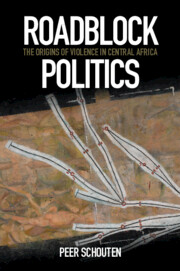Book contents
- Roadblock Politics
- Roadblock Politics
- Copyright page
- Epigraph
- Contents
- Figures
- Maps
- Tables
- Preface and Acknowledgements
- 1 Introduction: Sovereignty on a Shoestring
- Part I A Prehistory of the Roadblock
- 2 Hongo Polities (1830–1890)
- 3 Infrastructural Empire and Anti-colonial Resistance (1890–1960)
- 4 Ruination and the Revenge of Distance (1960–2000)
- Part II Roadblock Politics
- Conclusions
- Bibliography
- Index
2 - Hongo Polities (1830–1890)
from Part I - A Prehistory of the Roadblock
- Roadblock Politics
- Roadblock Politics
- Copyright page
- Epigraph
- Contents
- Figures
- Maps
- Tables
- Preface and Acknowledgements
- 1 Introduction: Sovereignty on a Shoestring
- Part I A Prehistory of the Roadblock
- 2 Hongo Polities (1830–1890)
- 3 Infrastructural Empire and Anti-colonial Resistance (1890–1960)
- 4 Ruination and the Revenge of Distance (1960–2000)
- Part II Roadblock Politics
- Conclusions
- Bibliography
- Index
Summary
If one picks up the travelogue of any nineteenth-century explorer, chances are it will discuss the payment of transit levies, or hongo as it was commonly called. Most European travellers dismissed hongo as mere blackmail. But to understand roadblock politics today, we need to acknowledge how significant such transit taxes were for the transformation of African politics. Chapter 2 zooms in on the heyday of these roadblock polities, roughly between 1820 and 1890, along two of the main long-distance trade routes into Central Africa: the Congo River and the trunk road from Zanzibar. Out of the narrow points of passage along them, the increasing circulation of goods valued in Europe and the USA allowed African communities to manufacture veritable roadblock polities. They forged power out of the capacity to withhold the minimal logistical requirements necessary for these pre-colonial supply chains to operate: the right of way, protection against robbery, and access to water and other basic supplies on which caravan travel relied. Control over such points soon became so important that it overtook other sources of power as the central driving force behind state formation in the region.
- Type
- Chapter
- Information
- Roadblock PoliticsThe Origins of Violence in Central Africa, pp. 25 - 53Publisher: Cambridge University PressPrint publication year: 2022

